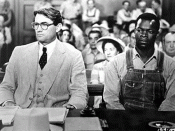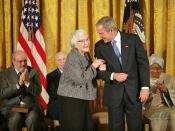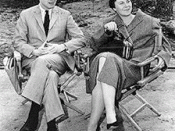Purity and Innocence to Knowledge of Nature All Children everywhere begin life innocent and without prejudice, Harper Lee effectively portrays this in the novel "To Kill a Mockingbird". In the beginning of the novel, Scout and Jem hold nothing but innocents, uncorrupted by our world of prejudice and racism. Their world is simple, sensible, a child's world, much like a Mockingbirds. However, by the end of the novel, their world has expanded to enclose the irrational nature of humans. Jem and Scout's feelings rapidly change from a series of events that shatter their innocence.
Aunt Alexandra introduced one of the first disturbances of the children's uncorrupted lives. Scout was crushed when Aunt Alexandra sent Atticus to talk to the Scout and Jem. " 'you are not from run-of-the-mill people, that you are the product of several generations gentle breeding...try to behave like the little lady and gentleman that you are' " (Lee 133).
Scout was upset because he was essentially telling her not to be herself. Aunt Alexandra wanted to change Scout's personality to conform to society's ideas of what was right for a girl in those times. It seemed like Atticus had almost encouraged them to find their own way, despite the disapproval of many in town. The incident with Atticus preaching Aunt Alexandra's ideas made Scout feel overwhelmed and worried about what was happening to her father, but shortly after he restored her faith by telling her "I don't want you to remember it. Forget it" (Lee 134).
When Atticus made his stand against the mob at the courthouse, Scout and Jem learned about some of the group dynamics that affect many mobs and gangs. Scout knew Mr. Walter Cunningham to be a good man, one that her father approved of. Yet he was in the...


